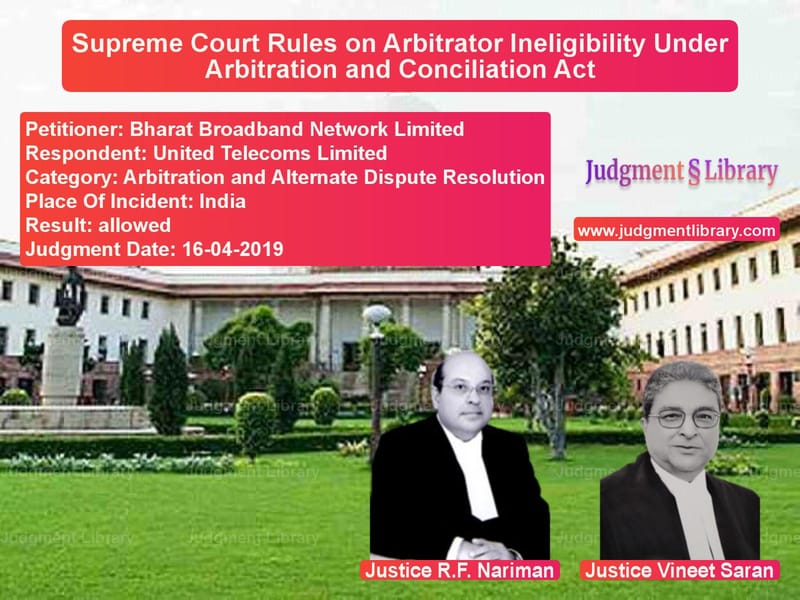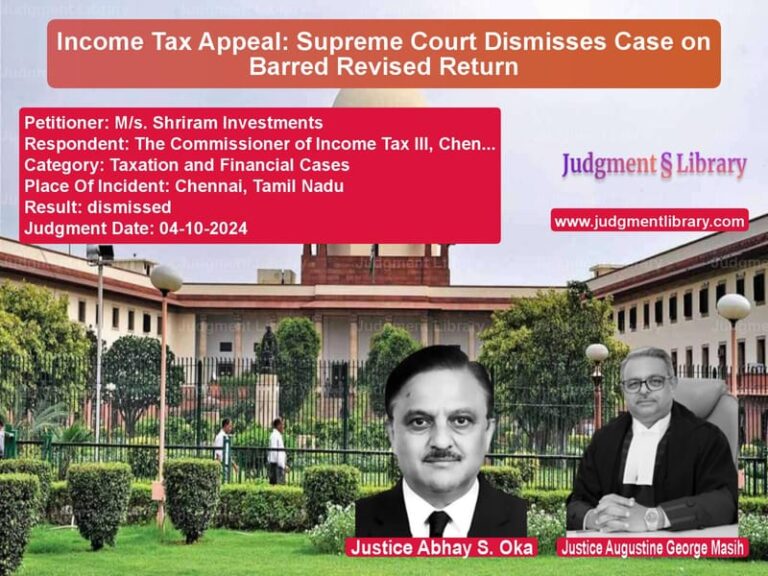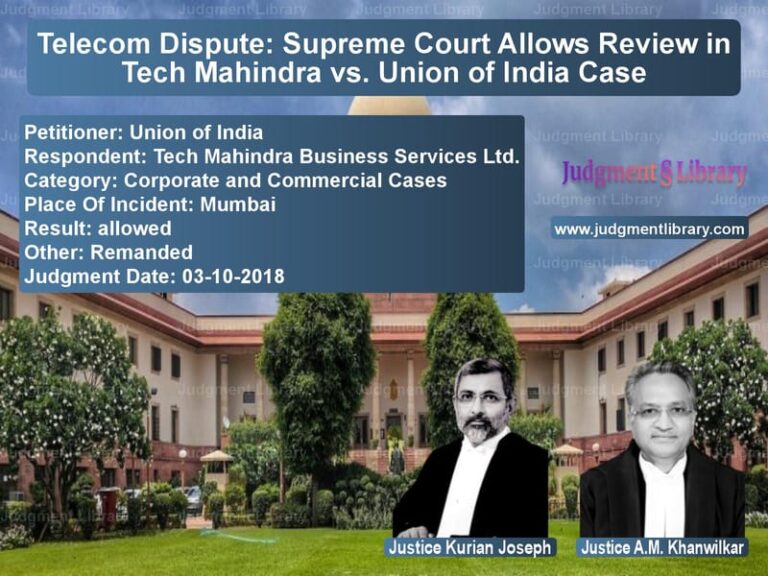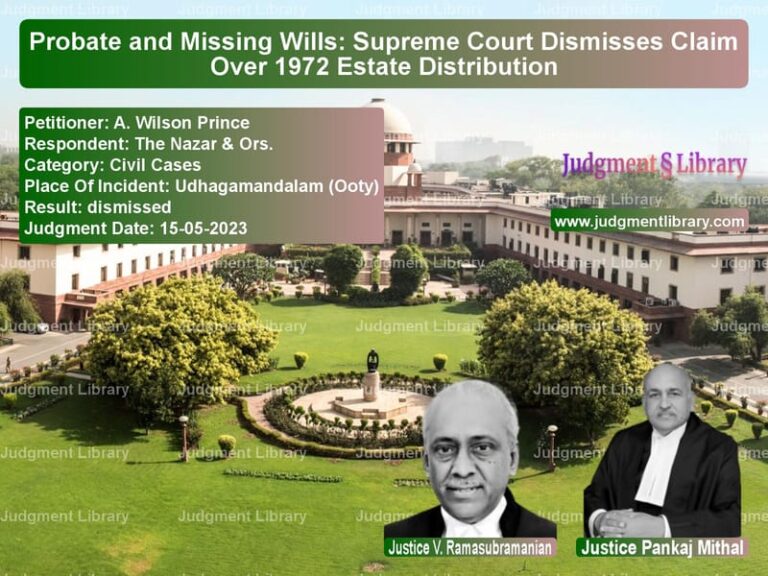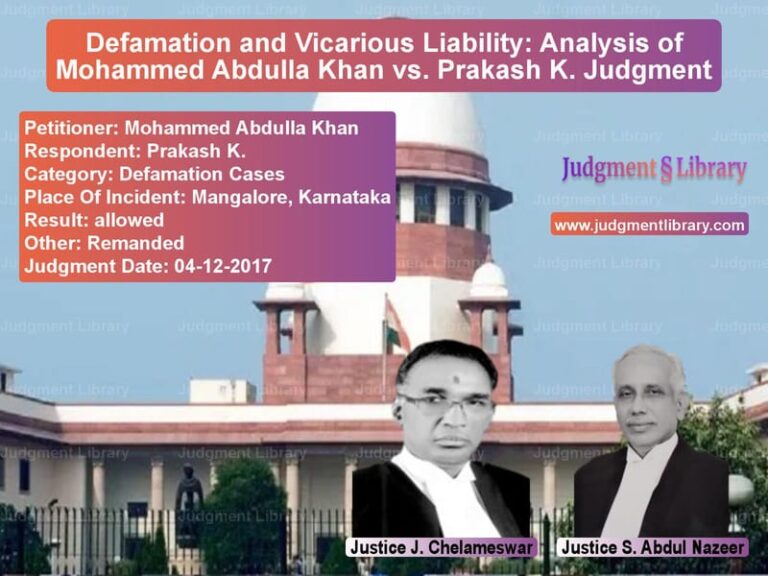Supreme Court Rules on Arbitrator Ineligibility Under Arbitration and Conciliation Act
The Supreme Court of India, in the case of Bharat Broadband Network Limited v. United Telecoms Limited, clarified the interpretation of Section 12(5) of the Arbitration and Conciliation Act, 1996. The ruling established that an ineligible arbitrator cannot appoint a substitute arbitrator and that such an appointment is void ab initio. The judgment has significant implications for arbitration law, particularly regarding the independence and impartiality of arbitrators.
Background of the Case
The dispute arose from a turnkey project tender issued by Bharat Broadband Network Limited (BBNL) on August 5, 2013, for supplying and maintaining GPON and solar power equipment. The respondent, United Telecoms Limited (UTL), was the lowest bidder (L1) and was awarded the contract through an Advance Purchase Order (APO) dated September 30, 2014.
The contract included an arbitration clause under Clause III.20.1 of the General (Commercial) Conditions of Contract (GCC), which stipulated that disputes would be referred to the sole arbitration of the Chairman and Managing Director (CMD) of BBNL or an officer appointed by them.
Key Issues Before the Supreme Court
- Whether the Managing Director of BBNL, who was ineligible under the law to act as an arbitrator, could still appoint another arbitrator.
- Whether the appointment of the arbitrator in the present case was void ab initio following the Supreme Court’s ruling in TRF Ltd. v. Energo Engineering Projects Ltd. (2017) 8 SCC 377.
- Whether a party that has itself appointed an arbitrator can later challenge the appointment’s validity.
Arguments by the Appellant (BBNL)
BBNL, represented by Additional Solicitor General, contended:
- The Managing Director of BBNL was ineligible to act as an arbitrator under Section 12(5) of the Arbitration and Conciliation Act as per the Supreme Court’s ruling in TRF Ltd.
- Since the CMD of BBNL was ineligible to act as an arbitrator, they could not have appointed another arbitrator.
- The appointment of Shri K.H. Khan as the arbitrator was invalid from the outset.
- The High Court erred in holding that the party appointing the arbitrator could not challenge the appointment.
Arguments by the Respondent (United Telecoms Limited)
The respondent, UTL, argued:
- The appellant (BBNL) had itself appointed Shri K.H. Khan as the arbitrator and had actively participated in the arbitration proceedings.
- BBNL was estopped from raising objections regarding the arbitrator’s appointment after participating in the arbitration.
- Under the proviso to Section 12(5), the parties had implicitly agreed to the appointment by proceeding with the arbitration.
Supreme Court’s Observations
The Supreme Court, in a judgment delivered by Justices R.F. Nariman and Vineet Saran, made the following critical observations:
1. Arbitrator Ineligibility is Absolute
The Court reaffirmed the principle laid down in TRF Ltd. that if a named arbitrator is ineligible under Section 12(5) and the Seventh Schedule, they cannot appoint another arbitrator. The Court held:
“Once the identity of the arbitrator as the sole arbitrator is lost, the power to nominate someone else as an arbitrator is obliterated.”
2. Void ab initio Appointments
The Court ruled that the appointment of Shri K.H. Khan was void from the beginning and could not be upheld.
“An ineligible arbitrator’s appointment or any nomination made by such an arbitrator is void ab initio and non-est in law.”
3. Waiver Under Proviso to Section 12(5)
The Court clarified that the waiver under the proviso to Section 12(5) must be an express agreement in writing and cannot be inferred from participation in arbitration.
“There is no express agreement in writing between the parties waiving the applicability of Section 12(5), and mere participation in arbitration cannot be deemed as a waiver.”
4. Parties Can Challenge Their Own Appointee
The Supreme Court held that a party appointing an arbitrator is not barred from later challenging the appointment if it is legally unsustainable.
“A party that has itself appointed an arbitrator can challenge the validity of the appointment when it is evident that the appointment is void under the law.”
Final Judgment
The Supreme Court set aside the High Court’s decision and held:
“The appointment of Shri K.H. Khan as arbitrator is void ab initio. The parties are free to approach the High Court for the appointment of a substitute arbitrator under Section 14 of the Act.”
Key Takeaways
- Ineligible Arbitrators Cannot Appoint Substitutes: If an arbitrator is ineligible under Section 12(5), any appointment they make is void.
- Waiver Must Be Express and in Writing: Mere participation in arbitration does not amount to a waiver of ineligibility.
- Void ab initio Appointments Have No Legal Effect: If an arbitrator’s appointment is invalid from the start, the arbitration proceedings conducted by them are also invalid.
- Judicial Oversight Ensures Fair Arbitration: The Court’s ruling emphasizes the importance of unbiased and independent arbitration.
Conclusion
The Supreme Court’s judgment in Bharat Broadband Network Limited v. United Telecoms Limited is a landmark decision in arbitration law. It reinforces the principle that arbitrators must be independent and impartial, ensuring that arbitration remains a fair and effective dispute resolution mechanism. The ruling clarifies that any ineligible arbitrator cannot continue to act or appoint another arbitrator, preventing any circumvention of the law.
Petitioner Name: Bharat Broadband Network Limited.Respondent Name: United Telecoms Limited.Judgment By: Justice R.F. Nariman, Justice Vineet Saran.Place Of Incident: India.Judgment Date: 16-04-2019.
Don’t miss out on the full details! Download the complete judgment in PDF format below and gain valuable insights instantly!
Download Judgment: Bharat Broadband Net vs United Telecoms Limi Supreme Court of India Judgment Dated 16-04-2019.pdf
Direct Downlaod Judgment: Direct downlaod this Judgment
See all petitions in Arbitration Act
See all petitions in Dispute Resolution Mechanisms
See all petitions in Enforcement of Awards
See all petitions in Judgment by Rohinton Fali Nariman
See all petitions in Judgment by Vineet Saran
See all petitions in allowed
See all petitions in supreme court of India judgments April 2019
See all petitions in 2019 judgments
See all posts in Arbitration and Alternate Dispute Resolution Category
See all allowed petitions in Arbitration and Alternate Dispute Resolution Category
See all Dismissed petitions in Arbitration and Alternate Dispute Resolution Category
See all partially allowed petitions in Arbitration and Alternate Dispute Resolution Category

